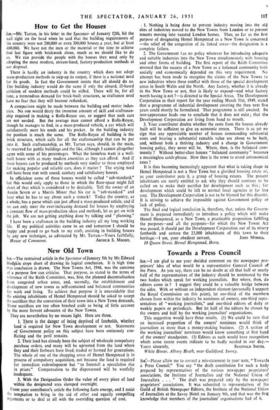New Old Town
Sia.—The restrained article in the Spectator ofJanuary 5th by Mr. Edward Hodgkin stops short of drawing its logical conclusion. It is high time that conclusion is drawn. The New Towns Act, 1946, was the outcome of a purpose few can criticise. That purpose, as stated in the terms of reference of the Reith Committee, was, first, the planned decentralisation from congested urban areas, and, secondly, the establishment and development of new towns as self-contained and balanced communities for work and living. To achieve that purpose it is unavoidable that the existing inhabitants of Hemel Hempstead should be asked to accept the sacrifices that the conversion of their town into a New Town demands. Those sacrifices are too often brushed aside as being of little account by the more fervent advocates of the New Towns.
They are nevertheless by no means light. Here arc three.
1. There is the danger of being deprived of freeholds, whether land is required for New Town development or not. Statements of Government policy on this subject have been ominously con- flicting and the peril remains.
2. Their land has already been the subject of wholesale compulsory purchase orders, and many will be uprooted from the land where they and their forbears have lived, traded or farmed for generations. The whole of one of the shopping areas of Hemel Hempstead is in process of compulsory acquisition, not because the land is required for immediate redevelopment but "to forestall a speculative rise in prices." Compensation to the dispossessed will be woefully inadequate.
3. With the Designation Order the value of every piece of land within the designated area slumped overnight.
From your contributor's article the following facts emerge, and I resist the temptation to bring in the aid of other and equally compelling a73uments or to deal at all with the overriding question of cost. 1. Nothing is being done to prevent industry moving into the old sites of industries moved to the New Towns from London or to prevent tenants moving into vacated London homes. Thus, so far as the first purpose of designating Hemel Hempstead as a New Town is concerned —the relief of the congestion of its linked areas—the designation is a complete failure.
2. The Government Las no policy whatever for introducing adequate and suitable industries into the New Town simultaneously with housing and other forms of building. The first report of the Reith Committee stressed that the success of a New Town as a balanced community both socially and economically depended on this very requirement. No attempt has been made to recognise the claims of the New Towns to new industries where these conflict with those of the special development areas in South Wales and the North. Any factory, whether it is already in the New Town or not, that is likely to expand—and what factory worth having is not 7—is directed to the Special Areas. The Development Corporation in their report for the year ending March 31st, 1949, stated that a programme of industrial development covering the then next five years could shortly be formulated. That programme is still awaited. Its non-appearance leads one to conclude that it does not exist ; that the Development Corporation are living from hand to mouth.
3. Your contributor doubts whether the rents from the houses already built will be sufficient to give an economic return. There is as yet no sign that any appreciable number of houses commanding substantial rents and bearing a substantial rateable value are about to be built, and, without both a thriving industry and a change in Government housing policy, they never will be. Where, then, is the balanced com- munity ? Without better-class houses " balanced community " becomes a meaningless catch-phrase. How then is the town to avoid astronomical rates ?
It is thus becoming increasingly apparent that what is taking shape in Hemel Hempstead is not a New Town but a glorified housing estate or, as your contributor puts it, a group of housing estates. The present inhabitants are surely entitled to ask why they should continue to be called on to make their sacrifice for development such as this ; for development which could be left to normal local agencies at far less cost, The Development Corporation is not to be blamed for this disaster. It is striving to achieve the impossible against Government policy or lack of policy.
The final and logical conclusion is, therefore, that, unless the Govern- ment is prepared immediately to introduce a policy which will make Hemel Hempstead, as a New Town, a practicable proposition fulfilling the purposes—and all the purposes—for which the New Towns Act was passed, it should put the Development Corporation out of its misery forthwith and restore the 23,000 inhabitants of this town to their






































 Previous page
Previous page